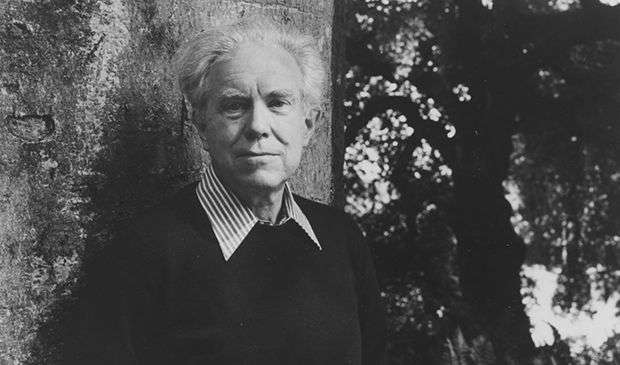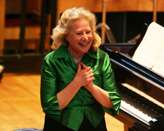|
Back
The Exuberance of Inspiration New York
Le Poisson Rouge
01/13/2013 -
Elliott Carter: Tempo e Tempi – Quintet for piano and strings – Con leggerezza pensosa – Tre Duetti for violin and cello – Gra – Fantasy for solo violin – Figment
Tony Arnold (Vocalist), Charles Neidich (Clarinet), Ursula Oppens (Piano), Rolf Schulte (Violin), Fred Sherry (Cellos), Ensemble LPR: Harumi Rhodes, Clara Lee (Violins), Mark Holloway (Viola), Mihal Marica (Cello), Michael Nicolas (Conductor)

E. Carter (© Nicholas Tucker)
“Independent diverse voices create harmony” Elliott Carter, on why his music is “American” (as quoted by Fred Sherry at Poisson Rouge).
Inexplicably, Elliott Carter was not sitting at a front row table in Poisson Rouge last night. Yes, this was a “memorial concert”, the composer had indeed died last November at the age of 103. But still, up to his very last year on this earth, Mr. Carter inevitably turned up with his new works. Sitting on the aisle, he would almost bounce up on the stage to acknowledge players and audience. The final year, he would stand up, wave to the audience, applaud the musicians.
He was physically frail, but he never lost that gnomic smile, and, when called to speak, his memory and charm never faded with age. So nobody would have been surprised if he showed up last night to applaud these master musicians who paid tribute to some of his manifold compositions.
In his place, though, cellist Fred Sherry, who had performed and worked with the composer over many decades, with Le Poisson Rouge itself, led some of New York’s fine artists in a septet of trenchant music, all from his last 30 years. Some of the pieces were bagatelles. But what bagatelles! Notes tumbling over each other, not haphazardly but with that longing which Carter had to produce sounds which delighted, often in spite of themselves.

F. Sherry (© Ben Esner)
The audience was a compendium of New York’s more discerning composers, critics and artists, so explanations would have been gratuitous. But those members of the overflow audience who were introduced to the music would have quickly understood those affirmative marks of the composer.
This was the music which (in Mr. Sherry’s quote about the composer), were to entertain his ear. And the entertainment was everywhere. Not joking or jolly entertainment, but an exuberance of inspiration. One wouldn’t dare use the pejorative “dissonant”, because–like Picasso’s fragmented faces–these harmonies, these voices, sung so naturally.
And even without a score at hand or detailed exegeses, it was obvious that Elliott Carter did not have a single squandered hemidemisemiquaver amidst all the thousands of notes last night. If the language was foreign to some, it was never alien. The musical engagements of players, while rough and tumble, eccentric, maddening, was never conflicts, but tournaments played for the joy of the game.
I did wish so much to have translations of the Italian poetry from the song cycle Tempo e Tempi. The poems, sung so effortlessly by Tony Arnold, varied in length from a minute to about eight seconds. So I wanted to know which phrase Carter was set in four measures, or which lines was for soprano and oboe alone? They were each so beautiful, so serene, and at times I almost felt the shadow of Monteverdi in the lines. No program translations would do, since one would be diverted, but perhaps before...a few words?
No translation was needed for the opening Con leggerezza pensosa, the “thoughtful lightness” an homage to Italo Calvino, whose novel I had just finished, which was funny reflective, a hall of mirrors with more riddles than answers. Mr. Sherry, with violinist Rolf Schulte and clarinetist Charlie Neidich, held their “trialogue” the way Mr. Calvino addressed his readers. They would argue with each other, pick up phrases, turn them around shudder with distaste and go on with relish and spirit.
Each ot these three had their own solo moments in some of Elliott Carter’s smaller works. Mr. Sherry went through the playful Figment, Mr. Schulte almost danced his way through the Fantasy, and in Gra, a Polish word for “game”, this homage to Lutoslawski was totally capricious. Mr. Neidich ran around the registers, whisking to the highest notes, apologizing with two measures of doleful retreat, pushing up higher, holding one note with changes of color and timbre, then going onto more games.

U. Oppens (© Hilary Scott)
The most substantial work (in terms of length) was the final Piano Quintet, a work which Ursula Oppens has played many times in her illustrious career. With all the dazzling note-play between strings and piano, the centerpiece is one of the gems of modern music. Mr. Oppens began with momentous chords, the kind which Bach might have put behind a Passion recitative. Ensemble LPR played above the chords, and slowly the partnership changed. I confess that it was difficult to discern the developments as the work went on, but in no way did this detract from the serenity of the music.
Nor would it have mattered. Mr. Carter’s compositions are incredibly intricate, but almost never severe. Those who went to Poisson Rouge for the “challenge” would have been disappointed, for the music spoke out with irrefutable delight. As Mr. Sherry explained, “If you hear Bach in the music, you are correct. If you hear jazz, you are correct.”
“Whatever you hear, you are correct.”
Harry Rolnick
|